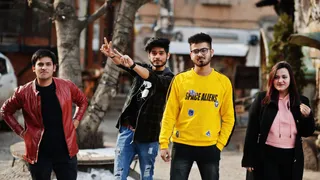Updated: Sun, 12 Oct 2025 11:20 am (IST) The failure of political parties, called “Pieces Deliver”, to unite in the Bihar election, became a victim of politics. Political differences, a lack of unity and personal ambitions are the main reasons for this. A lack of strong leadership is also a major challenge, thereby an obstacle to achieving the collective goal. Students missing from Bihar politics. File Photo Prashant Singh, Patna. Election dates were announced in the state. Migration, employment, jobs and corruption are the issues. In the midst of efforts to consolidate the role players, there is an attempt to make women and the elderly a class. In the midst of all this, where are the students who dream of the future, their questions remain unanswered. Remove ad read only the news. The great thing is that there is no strong student organization in Bihar to check it, while it is the same condition where the students did the first movement after independence in 1955, only because the system to cut tickets from the state transport buses was not expected. To suppress the anger of the students, the police set fire to, whereby one student, Dinanath Pandey, died after he was shot. The movement flared up in such a way that then Prime Minister Jawaharlal Nehru had to intervene. The then Transport Minister Mahesh Prasad Singh had to resign. The second student movement took place in 1966. It started with the RDS College, Muzaffarpur. The students were furious because of the police with the professor of university physics, Dr. Devendra Prasad Singh, trade. When the excitement intensified, police entered the campus and set fire to the death of a student and a professor. It added fuel to the fire and the movement spread across the state. The entire society was upset, the result was that Congress government, when the election was held in the meeting in February 1967, was overthrown. The student movement laid the basis of a non-congress government in the state for the first time. Mahamaya Prasad Sinha of Patedhi village Maharajganj, Siwan, is the chief minister of the state’s first non-congress government. Mahamaya was the only MLA of the Krishak Mazdoor Praja party (considered an independent because it was an unrecognizable party), but because he was dear to the students, all the opposition parties of Congress unanimously elected him as chief minister. It was the first incident of an independent MLA elected to Chief Minister. He was extremely active in the 1966 student movement and called students ‘pieces of my liver’ in speeches, which won the hearts of the students. For this reason, in the 1967 election, he defeated the then Chief Minister Krishna Ballabh Sahay of Patna West by about seven thousand votes. In 1974, when JP led the students’ movement against corruption and gave the slogan of total revolution, the governments of the state and the country changed. The students strongly opposed the emergency. The meaning is that from time to time, the students still became pieces of the heart of politics but could never unite. For this reason, he cannot come to the top position in the manifesto of the parties and continue to seek himself between promises and reality. Know the story of an independent who became the chief minister in 1967. In 1967, elections were held for 318 meetings seats from Bihar. When the results came, Congress was the largest party with 128 MLAs, but despite being elected as the leader of the Legislative Party, Mahesh Prasad Singh was opposed by 32 MAs of the party. After that, Congress abandoned the idea of claiming the government. Governor Ananth Shayanam Iyengar asked the opposition to come forward to form the government. Then all the opposition parties formed the Joint Legislative Party (Samvid). There were 24 MAs of CPI, 68 of the Socialist Party, 26 of Jan Sangh, 18 of the Praja Socialist Party, 13 of Jan Kranti Dal, three of the Swatantra party, four from CPI (M), one of the Republican Party of India and 33 independent MAs. Everyone decided on a minimum general program of 33 points. For two reasons, the MAs chose Mahamaya Prasad Sinha as Chief Minister. First, he defeated the then Chief Minister in the election. Secondly, he was universally accepted among the students. Karpoori Thakur of the largest opposition party, the Socialist Party, was made the Deputy Chief Minister.
Bihar Politics: Students could not unite in Bihar, once coin was used – students with a strong presence in Bihar politics marginalized due to lack of unity
